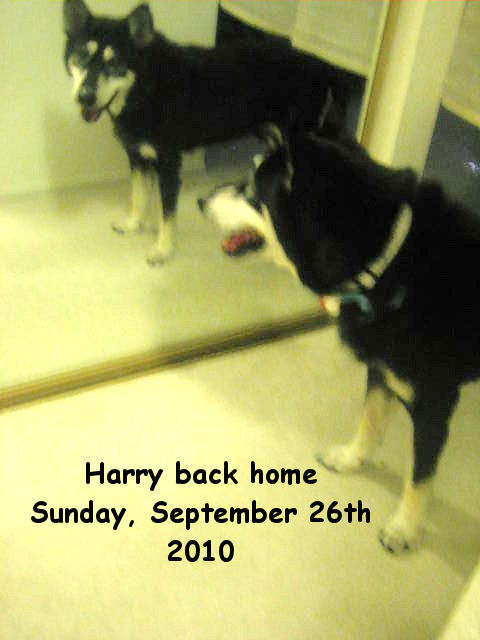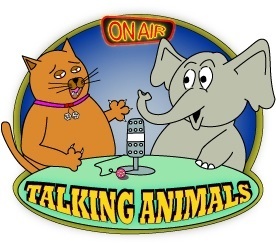Harry was freed from a shelter and returned to his loving owner by a husband and wife team (and their four dogs), Operation Roger volunteers all. Harry sat in the cab for the duration of the cross-country trip, then greeted his ‘mom’—who had to leave him behind when she escaped from her abusive husband--by covering her in wet kisses.Breaker, Breaker--Roger That!
Sue Wiese Mobilizes Truckers, Touches Pet Lovers’ Hearts With ‘Operation Roger’
By Duncan Strauss
Host, ‘Talking Animals,’ at NPR affiliate station WMNF-FM, Tampa, Florida; online at www.talkinganimals.netThe expression “Keep On Truckin’“ can’t help but feel like an antiquated phrase, in that it evokes perhaps most famously the comic by R. Crumb—which goes back to the late ‘60s—and Crumb’s work was intended as a visual rendering of a phrase from the Blind Boy Fuller song, “Truckin’ My Blues Away,” which hails from the 1930s.
But in some ways, “Keep on Truckin” has come barreling back as a fresh new war cry in the realm of finding pets new homes--and delivering them there. This linguistic revival (which may exist only in my mind) arrives thanks to Operation Roger, a nonprofit organization consisting of long haul and regional truckers who use their trucks to transport dogs, cats and other domestic pets—who’d previously been living in shelters—to new homes across the country.
Operation Roger is the brainchild of Sue Wiese, a 69-year-old retired trucker based in Joshua, Texas, who, during her trucking days, brought the family pets—including a Manchester Terrier named Roger—to keep her company on her runs. In a Talking Animals interview a few days before Christmas, Wiese explained how the sweeping devastation left in the wake of Hurricane Katrina, including all the pets rendered homeless and stranded, served as the eventual catalyst for launching Operation Roger.
“My traveling companion, Roger, had passed in June of 2005 and I was missing him,” she recalled. “And then Katrina, followed by Rita, hit. We can all remember how we felt about the horror stories we were watching and hearing about. And I was driving down the road, listening and praying, wondering, ‘What can I do? I’m just a truck driver.’ And then I heard one word—‘transport’—and it blew me away.”
Operation Roger truckers reunite Daisy Jo with her family after she and her owner had been separated for six months.It wasn’t, she hastens to humbly add, a complete light bulb moment for her (“I couldn’t see the big picture”), noting that it took a trucker friend and Wiese’s daughter to help her connect the dots, and formulate a plan. They encouraged Wiese to appear on a radio talk show boasting a huge audience of truckers, and sort of road test her idea. Overcoming almost immobilizing nervousness, she did so--under her CB handle, Classy Lady—asking if there were any other truck drivers listening who might be interested in helping with her nascent project.
“By the time the interview ended, I had 12 calls to return,” she remembered, seemingly marveling anew at the response her jittery plea elicited some six-plus years ago. Not long after that interview--on Sept., 16, 2005 to be precise--the first Operation Roger run rumbled down the road, ultimately transporting a dog from Missouri to Arizona.
A commercial spot for Operation RogerGiven the geography and logistics involved—including that the trucker who’d volunteered to make this maiden voyage kept having her schedule and routes altered by the trucking company—this mission took multiple drivers, and multiple weeks, to complete. It also necessitated the use of so-called “layover homes,” where families along the way serve as short-term foster parents of the pet, because the process often involves more than one driver, scheduled on more than one route, to deliver the animal to the final destination. And it may take a few days, or longer, of that animal roosting at the layover home before the next trucker in this fanciful relay can pick up that fauna cargo for the next leg.
In the two months remaining of that first year, Wiese figures they transported upwards of 10 animals. Operation Roger’s total tally of animals delivered to new homes, as of the Talking Animals interview on Dec. 21, was 606. They did four more before the end of 2011—and they’ve already transported a handful in 2012; they maintain and present a running total on the top of their website, where visitors also can contribute to help fund the group’s visit to the Mid-America Truck Show (MATS) in Louisville, KY, March 22-24, where, as the website states, “we reconnect with current and former drivers as well as reach out to drivers who have never heard about truckers who volunteer to transport needy pets across the country.”
We try not to traffic here in such clichés as “win-win,” or perhaps more fittingly in this case, “win-win-win,” but Operation Roger yields all kinds of virtues for all parties. For the shelters and rescues, it vastly expands the possibility of placing the animals ensconced there in forever homes, widening the pool of potential adopters well beyond the surrounding community—they could live two or three states away, or on the opposite coast, yet a placement is perfectly possible.
Beyond those potential adopters, others who benefit from Operation Roger’s services include families who through divorce, or other changed employment or housing circumstances, live in a different part of the country and need help getting their pet(s) transported to the new home.
Of course, the Operation Roger animals themselves are beneficiaries—their transfer papers mean they’re not only being sprung from the grim life of residing at a shelter, but in many cases avoiding a decidedly more grim fate of being euthanized. And landing at the home of people who really want them.
And perhaps less obviously, this whole enterprise is a huge boon for the truckers—who are asked to submit an application to join the Operation Team (as are folks interested in providing layover homes), then, if cleared, are required to take an orientation and safety class--in a host of ways, including a profound, public service element, Wiese explains.
“The thing that the drivers say is that this is a way they can give back to the community,” Wiese says, “which they cannot do when you’re a trucker because you’re on the road. You can’t really volunteer at home very easily, but this is a way they can.”
It was worth it: after a truck trip of a month and a half, from North Carolina to California, Roxie makes it home to an owner who cares about her and will surround her with other furry friends.Wiese says there are now about 30 truck drivers on the Operation Roger roster, up nicely from that 12 who responded to her initial broadcast entreaty back in ’05, but far fewer than she’d like to have. And she’s always in recruitment mode (for layover homes, too), extending the invitation on Talking Animals to prospective new comrades to visit the Operation Roger website; or e-mail her: operationroger01@yahoo.com; or call her: 682-622-1172
Wiese couldn’t be more serious about her commitment to Operation Roger and the work involved, but in further espousing the array of virtues enjoyed by drivers joining her mission she’s not immune to levity: “It’s really good for the truckers to have animals on board the trucks with them. It makes them get out and walk, and gives them something besides a fly to talk to.”
And gives the animals something besides a shelter cage to talk to.
To hear the entire Sue Wiese interview with Talking Animals host Duncan Strauss, follow this link: www.talkinganimals.net
Founder/Publisher/Editor: David McGee
Contributing Editors: Billy Altman, Laura Fissinger, Christopher Hill, Derk Richardson
Logo Design: John Mendelsohn (www.johnmendelsohn.com)
Website Design: Kieran McGee (www.kieranmcgee.com)
Staff Photographers: Audrey Harrod (Louisville, KY; www.flickr.com/audreyharrod), Alicia Zappier (New York)
E-mail: thebluegrassspecial@gmail.com
Mailing Address: David McGee, 201 W. 85 St.—5B, New York, NY 10024




